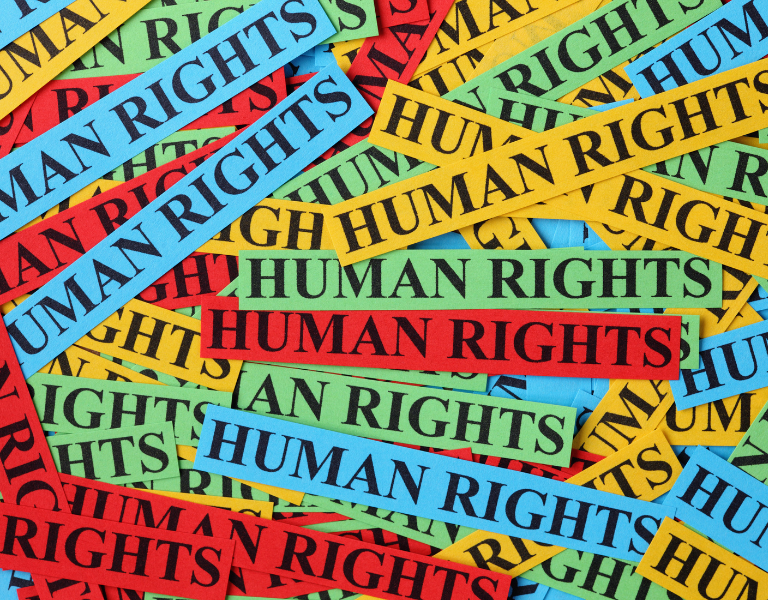
Lydia Murphy, Development Officer, The Poverty Alliance
The Scottish Government recently consulted on a new Human Rights Bill. To ensure the views of people with experience of poverty were reflected in our response the Poverty Alliance facilitated a workshop exploring some of key questions in the consultation.
People stressed that public bodies should have the duty to include people with lived experience of poverty in the design of policies and services and in monitoring and accountability processes. They also felt that public bodies should have to evidence their engagement with people, particularly those deemed 'harder to reach’ as part of their reporting responsibilities under the Bill.
‘Participation should definitely be required by law. It helps us shape our environment. It ensures minorities and people who are hard to reach are consulted.’
‘It should be straightforward and there shouldn’t be barriers. It shouldn’t just be a box ticking exercise. Anyone who is doing something should prove that they have engaged with us.’
During the workshop, people with experience of poverty also emphasised that participation should be meaningful.
‘Using good models that can make sure that that participation is meaningful and not just the tick box exercise. But I think it has to be right from the beginning.’
The group felt positive about the idea of having all our economic, social and cultural rights in law. However, there were concerns about the situation of asylum seekers and whether this group would be covered by the Bill.
‘It should address a wide range of human rights issues to promote equality and justice but in circumstances where the bill doesn't cover everyone it lacks inclusivity.’
The absence of easily accessible information about human rights was a significant barrier to understanding rights, particularly due to the complexity of technical language that is often associated with human rights.
‘Sometimes you read, but if you're not a lawyer, if you're not specialised, legal advice is is very, very difficult to understand’
‘The law is so complex and there are not enough places to get legal advice. You can sometimes rely on friends, but the information may not be accurate’
‘It was easy to get a Citizen’s Advice appointment 10 years ago, but it is very difficult now. An increase in things like Legal Aid would be helpful. There needs to be investment in our communities for Citizen’s Advice and other advocacy organisations’
People felt that there should be an avenue for public bodies to recognise and rectify mistakes immediately.
‘Who should help me? In a perfect world the person who is violating my right – there should be someone accountable in that organisation’
They felt it was important that wider support was offered to people on low incomes to make complaints procedures accessible, including supporting with travel expenses and childcare if in-person meetings are needed.
‘It needs to be recognised that complaining can be difficult and stressful.’
‘Support with childcare, like if you've got to attend meetings and your transport like, you know, logistically I think is really important. I think, it’s too easy for office bearers to be like ‘OK, just come to the city centre at 9:30’ and you've got to work out all the logistics going on. Same with accessibility requirements.’
People wanted clear, jargon-free complaints processes with information available in a variety of formats to accommodate diverse needs.
They called for a pathway to ensure those who are responsible at the highest level of government are held accountable and the changes are made to ensure that others do not suffer the same rights violations. There were concerns from participants around the possibility of public bodies using compensation in place of real change and investment.
‘It’s easy for a local authority to give someone cash, but harder to find suitable housing’
‘It would work if actually delivered but there has to be accountability there. There has to actually be a penalty. If its outwith their realm to fix it then it needs to go to Scottish Government’
‘Services are under a lot of pressure and there needs to be investment’
People want to increase the powers of Scottish Public Services Ombudsman (SPSO) People were particularly supportive of proposals to allow complaints to be made verbally.
‘I’m impressed with how open and accessible ombudsman could be with legal complaints – it’s a good starting point’
Access to advice and advocacy was seen as vitally important. People agreed with proposals put forward Human Rights Consortium Scotland of a National Hub for Human Rights Information, Education, Legal Services and Advice co-produced with groups of people whose rights are most at risk, but emphasised the importance of providing community based advocacy and information.
‘it's the kind of change I would want in the future regarding when it comes to information and awareness of human rights, I can’t go for anything less’
All these conversations, together with our engagement with people with experience of poverty as part of Human Rights Consortiums All our Rights in Law project, and our wider research and engagement work formed the basis of our consultation response on the Human Rights Bill for Scotland.
Taken together the new Human Rights Bill is a crucial step forward for human rights in Scotland. It needs to go as far as possible in incorporating all our rights, making them enforceable and real through improved access to justice. We will continue to work with people experiencing poverty to campaign for a Human Rights Bill implemented as fully as possible within devolution and as strong as possible to make a difference in people’s lives.


Enter your email address to receive regular e-updates about our work. If at any time you want to stop receiving these, simply contact us. We’ll keep your details safe and won’t share them with any other organisations for their marketing purposes. For full details see our Privacy Policy.